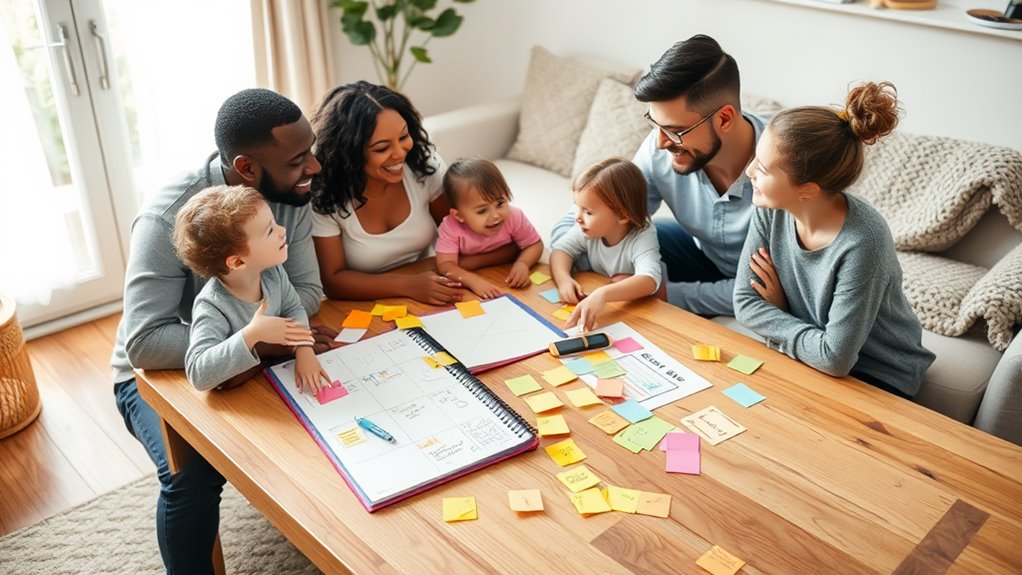The Benefits of Mindfulness for Parents
As a parent, you often juggle countless responsibilities, and it can feel overwhelming at times. Mindfulness offers a practical approach to help you navigate these challenges with greater ease. By focusing on the present moment, you can reduce stress and respond more thoughtfully to your child’s needs. This practice not only enhances your emotional regulation but also deepens your connection with your child. Imagine transforming those hectic days into moments of meaningful interaction. What if you could create a more harmonious home environment through simple mindfulness techniques?
Understanding Mindfulness
To truly grasp mindfulness, you need to break it down into its core elements. Mindfulness is all about being present in the moment, noticing what’s happening right now. You might find your mind wandering, thinking about the grocery list or tomorrow’s schedule. That’s normal! Simply acknowledge those thoughts and gently bring your focus back, like a puppy returning to its owner after getting distracted by a butterfly.
Being mindful means tuning into your senses. Take a moment to notice the sounds around you, the warmth of the sun, or the taste of your morning coffee. It’s like playing a game where you’re an explorer discovering the world around you.
You don’t have to be perfect at it, either. Mindfulness isn’t about clearing your mind completely; it’s more about observing your thoughts without judgment.
When you practice this, you might feel more connected to your feelings and your family.
Reducing Stress Levels
Managing stress levels is essential for parents steering through the daily demands of family life. You’ve got a lot on your plate—juggling school runs, work, and family time can feel like a circus act. That’s where mindfulness comes in to save the day!
When you practice mindfulness, you create a little bubble of calm amid the chaos. It’s like hitting the pause button on that never-ending to-do list.
Taking just a few minutes each day to focus on your breath or notice the little things around you can work wonders. You might find that simply sitting quietly with a cup of tea, listening to the sounds of your home, helps you feel more grounded.
As you tune into the present, you’ll notice your worries start to fade away, making room for more joy.
Mindfulness can also help you respond to stressful moments with a bit more grace. Instead of reacting instantly to a tantrum or a spilled drink, you’ll feel more equipped to handle it with a smile, or at least a chuckle!
Enhancing Emotional Regulation
Amid the whirlwind of parenting, enhancing emotional regulation can feel like an intimidating task. You’re juggling nap times, school projects, and unpredictable moods, all while trying to keep your cool. But don’t worry, mindfulness can help!
By practicing mindfulness, you can learn to take a step back during those chaotic moments. Instead of reacting right away, you’ll start to pause and breathe, giving yourself a chance to think.
Picture this: your child throws a toy across the room. Instead of snapping, you take a deep breath and count to three. This simple act helps you respond calmly rather than react impulsively. Over time, you’ll notice that you’re better at managing your feelings. You’ll feel more in control, and that’s a win!
Mindfulness also improves your ability to recognize your emotions. When you’re aware of what you’re feeling, it’s easier to choose how to react. You can find that moment of clarity, even in stressful situations.
Strengthening Parent-Child Relationships
How can mindfulness transform your relationship with your child? Well, practicing mindfulness helps you become more present, which means you can fully engage with your child. When you’re focused on the moment, you’re better equipped to listen to their thoughts, feelings, and even their silly jokes without zoning out. It’s like giving them the gift of your attention, and trust me, kids really appreciate that!
Being mindful also helps you respond to your child’s needs with empathy and understanding. Instead of reacting to their outbursts or frustrations, you can take a deep breath and respond calmly. This creates a safe space for them to express themselves, knowing they won’t be met with anger or frustration.
Plus, it sets a fantastic example for them, showing how to handle emotions in a healthy way.
And let’s not forget about the fun! Mindfulness can turn everyday activities, like cooking or playing games, into special bonding moments. You’ll find joy in the little things, like sharing a laugh over spilled cereal or a dance-off in the living room.
Boosting Overall Well-Being
While you navigate the challenges of parenting, incorporating mindfulness into your daily routine can greatly boost your overall well-being. Imagine starting your day with just a few minutes of deep breathing. You’ll feel more centered and ready to tackle whatever chaos comes your way.
Mindfulness helps you stay present, reducing stress and anxiety and letting you enjoy those small moments that often slip by unnoticed.
When you’re mindful, you become more aware of your feelings and thoughts. This awareness can lead to better emotional regulation, so you won’t find yourself snapping at your kids over spilled juice.
Plus, it can improve your focus, which means you’ll be more efficient in managing your to-do list (and we all know how long that can get!).
And let’s not forget about self-compassion. Mindfulness encourages you to be kinder to yourself, reminding you that it’s okay to make mistakes.
After all, parenting doesn’t come with a manual! So, take a moment to breathe, appreciate your efforts, and give yourself a little grace.
Practicing Mindfulness Daily
Incorporating mindfulness into your daily routine doesn’t have to be complicated. You can start with just a few minutes each day. Try setting aside a specific time, maybe during breakfast or just before bed. Close your eyes, take a deep breath, and focus on the present moment. Notice your thoughts, but don’t judge them; just let them float by like clouds in the sky.
Another simple way to practice is during everyday activities. When you wash the dishes, really feel the warm water, and listen to the clinking of the plates. Or, when you’re walking, pay attention to each step you take. You might even find a little joy in the process!
You can also use reminders, like sticky notes on the fridge or a phone alert, to bring your attention back to mindfulness. Remember, it’s about being present, even when life gets busy.
And hey, if your mind wanders—no worries! That happens to everyone, even the most seasoned yogis. Just gently guide your focus back to the here and now.
These little moments can make a big difference in your day, and they help you feel more connected to your family, too.
Resources for Mindful Parenting
Finding resources for mindful parenting can greatly enhance your journey toward being more present with your children. There are plenty of books, podcasts, and websites out there to help you along the way.
For starters, check out “The Whole-Brain Child” by Daniel J. Siegel and Tina Payne Bryson. It’s packed with useful tips, and you’ll find it easy to read, too.
If you prefer listening, look for podcasts like “The Mindful Kind.” They offer bite-sized episodes that fit right into your busy schedule, giving you quick doses of mindfulness to practice with your kids.
Websites like Mindful.org are also fantastic. They feature articles and guides on mindfulness and parenting, making it easy to find what you need.
Don’t forget about apps! Calm and Headspace both have sections dedicated to parents, with guided meditations that can help you feel more grounded.
Lastly, consider joining a local parenting group or online community. Sharing experiences with others can be both supportive and fun!




